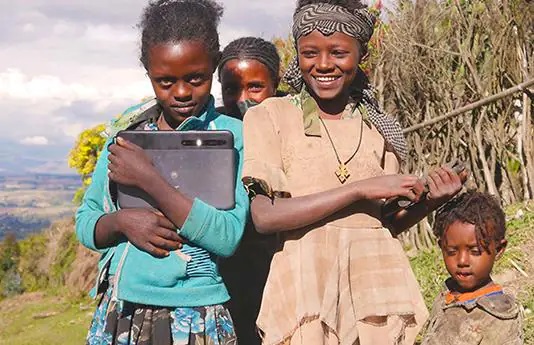During the first year of the COVID-19 pandemic, I was a student, an instructor, an ed-tech social entrepreneur, and a mother. I was juggling these roles as best as I could without losing my mind. In the process, however, I learnt a lot about education. Most of all, it became painfully clear to me that the education sector is very much ripe for innovation. This is especially true in developing countries. So, here’s what I learnt:
Innovation 1: Record classes to level the playing field for students.
Okay, maybe this one is a no-brainer. But let me explain. The ed-tech social enterprise that I run, Education for Ethiopia, aims to provide digital K-12 STEM lessons in local languages. One of the most useful services we provide is not innovative at all. It is just the ability for students to view pre-recorded courses that they can pause, rewind and play again. This simple ability can make sure that students in my country, who miss classes for whatever reason (and there are many), are able to catch up.
I didn’t quite appreciate this until I experienced it as a student myself. I was taking some MBA classes online at CKGSB, which would not have been an option had it not been for the pandemic. When I was too tired to concentrate, when I did not have a three-hour block of time to dedicate to a class or when I needed to pause so I can look back at my notes, those pre-recorded classes were lifesavers! Now imagine if a student in a developing country missed classes for days or even months at a time due to civil unrest, a natural disaster or family issues? Recorded classes would make a huge difference.
Innovation 2: Schools are bigger than education so invest more in them.
The rise of digital education may give the illusion that schools are a thing of the past. For me, that couldn’t be further from the truth. Schools are bigger than education. They are a place to eat, socialize and a place of refuge. The World Food Program (WFP) disclosed that one in two schoolchildren, or 388 million kids, were eating at school before the pandemic1. When schools closed during lockdown, many kids were not just missing their classes, they were also missing nutritious meals. Therefore, if we want to make education better globally, especially in developing countries like Ethiopia, we need to make sure that schools are strengthened in ways that are beyond just education.
Schools also serve parents. I know I am not alone when I say that without schools, it would be impossible for me to properly raise my child. It is a disgrace that around the world, teachers are perpetually underpaid. When the pandemic hit, many parents and students suffered because they couldn’t replicate the learning environment that schools and teachers provide. Even in developed countries like the US, students fell 4 to 5 months behind in their schooling in the 2020-2021 academic year2. Without schools, parents also experienced intense burn-out.
All this is to say that schools are not just learning centers. They are a hub where all who are invested in future generations congregate—students, parents, teachers and government bodies. Therefore, each stakeholder in the school environment needs to be supported, actively involved, and heavily invested in. That is the most socially innovative thing we can do.
Innovation 3: Teaching is an art, and it must be valued.
One of the hats I wear in Education for Ethiopia is as an instructor of various courses. And this role has taught me that teaching is an art, in the very literal sense.
Art is rooted in culture, language, lived experience and aesthetic values. That is why a certain type of painting, sculpture or music can be a unique expression of a particular group of people. Teaching is no different. How you teach, the examples you use, and the sentiments you evoke, are all very important when you try to impart knowledge. That is why we at Education for Ethiopia aim to create content in local languages, in the cultural context that students find themselves in.
As teaching migrates to the digital sphere, it is important to keep in mind that it is a form of expression that each community, regardless of location, is entitled to. We need to find ways to make students around the world feel like what they learn is indeed designed for them by reflecting their realities in their lessons. And technology can easily facilitate this process by making it easy to produce and disseminate content. This is especially important during uncertain times, when normal schooling is disrupted.
By Lina Getachew Ayenew
Lina Getachew Ayenew is an author and social entrepreneur from Ethiopia. She is the founder of Education for Ethiopia, an organization that aims to bring digital education to Ethiopian students. Education for Ethiopia’s platform, Saquama, serves thousands of Ethiopian students by offering language and STEM lessons in Ethiopian languages. Lina is also the author of “The Complete Beginner’s Guide to China-Africa Relations,” which was published in 2019 and still serves as a go-to guide for individuals and organizations in the field. Lina serves on the Yale-China Association’s board and is a graduate of Yale University (BA and MPH) and the Cheung Kong Graduate School of Business (MBA).




















